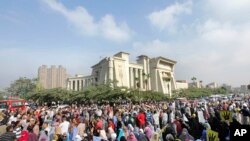CAIRO —
From president to prisoner.
Former Egyptian President Mohamed Morsi made his first public appearance since his ouster in July - at a criminal court in Monday.
But it was over almost as soon as it began. Morsi's trial was adjourned shortly into the first session, after defendants began chanting in protest. Reports from inside the courtroom say Morsi, who was deposed by the military after popular protests, rejected the proceedings, telling judges he remained the nation's legitimate president.
Morsi and 14 members of his Muslim Brotherhood and former government face charges of inciting murder during protests against him last December. If found guilty, he could face the death penalty.
The start of the trial was delayed because Morsi rejected wearing the traditional white jumpsuit of defendants. Security was on high alert after a last minute switch of venue to a police academy on the outskirts of Cairo, the same complex where Morsi's predecessor, the also-ousted Hosni Mubarak, was tried.
The interior ministry has deployed 20,000 security forces to forestall more of the unrest that has seen more than 1000 people killed since Morsi's overthrow and authorities began a crackdown on his supporters and other Islamists.
Members of the Anti-Coup Alliance took to the streets across the nation again Monday against what they see as a purely political trial, focusing on court buildings in Cairo and elsewhere.
Yet many Egyptians defend the moves against Morsi, Egypt's first freely elected president. Political sociologist Said Sadek of the American University in Cairo argues the former president's brand of Islamist politics would have left the country in ruin.
"The whole world would have condemned the Egyptians: 'You saw your country was being destroyed. Why didn't you take action? Why did you stand still and watch like zombies your country being destroyed?" Sadek questioned.
Many express faith the judiciary will act fairly, and that the trial represents a return to the promises of Egypt's revolution of 2011.
But where some see the expression of popular will, others see the re-emergence of Egypt's bedrock force.
Professor Christian Donath of the American University in Cairo. "Even the most powerful can sort of fall from grace. But of course the question is how they fall from grace and who is putting these leaders on trial and I think, you know, a key player in this is the military," Donath said.
Donath said that is something Egypt will have to deal with, once again, for a long time to come.
State media say Morsi's trial is set to resume January 8.
Former Egyptian President Mohamed Morsi made his first public appearance since his ouster in July - at a criminal court in Monday.
But it was over almost as soon as it began. Morsi's trial was adjourned shortly into the first session, after defendants began chanting in protest. Reports from inside the courtroom say Morsi, who was deposed by the military after popular protests, rejected the proceedings, telling judges he remained the nation's legitimate president.
Morsi and 14 members of his Muslim Brotherhood and former government face charges of inciting murder during protests against him last December. If found guilty, he could face the death penalty.
The start of the trial was delayed because Morsi rejected wearing the traditional white jumpsuit of defendants. Security was on high alert after a last minute switch of venue to a police academy on the outskirts of Cairo, the same complex where Morsi's predecessor, the also-ousted Hosni Mubarak, was tried.
The interior ministry has deployed 20,000 security forces to forestall more of the unrest that has seen more than 1000 people killed since Morsi's overthrow and authorities began a crackdown on his supporters and other Islamists.
Members of the Anti-Coup Alliance took to the streets across the nation again Monday against what they see as a purely political trial, focusing on court buildings in Cairo and elsewhere.
Yet many Egyptians defend the moves against Morsi, Egypt's first freely elected president. Political sociologist Said Sadek of the American University in Cairo argues the former president's brand of Islamist politics would have left the country in ruin.
"The whole world would have condemned the Egyptians: 'You saw your country was being destroyed. Why didn't you take action? Why did you stand still and watch like zombies your country being destroyed?" Sadek questioned.
Many express faith the judiciary will act fairly, and that the trial represents a return to the promises of Egypt's revolution of 2011.
But where some see the expression of popular will, others see the re-emergence of Egypt's bedrock force.
Professor Christian Donath of the American University in Cairo. "Even the most powerful can sort of fall from grace. But of course the question is how they fall from grace and who is putting these leaders on trial and I think, you know, a key player in this is the military," Donath said.
Donath said that is something Egypt will have to deal with, once again, for a long time to come.
State media say Morsi's trial is set to resume January 8.






